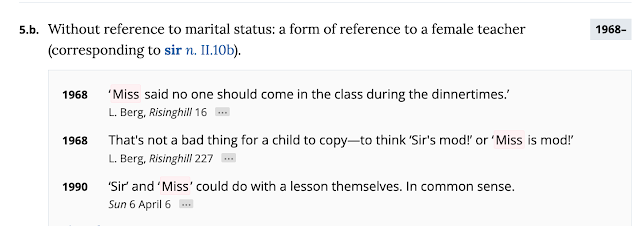Here's an argument that doesn't fit well in 140 characters, but I'm constantly being confronted with it on Twitter (and in real life), so I hope you'll excuse me getting it out of my system so that I can just send people a link from now on.
This is the kind of thing I get:
I suggest you stop calling yourselves American. It is arrogant of people from the United States to call themselves Americans because America is a whole continent. They should be called [insert long-winded or whimsical epithet here].
So, let's break that argument down...
I suggest... It is arrogant...
Individuals from the USA call themselves
American because that's the word we have. They typically don't have an imperialist agenda intent on taking over or obliterating other people in the western hemisphere, they're (we're) just using the word that's at hand. But let's unpack this a bit more.
Let's say I meet a young man named
Tom Jones. Would it be appropriate for me to say to him "It is arrogant of you to call yourself
Tom Jones because there's another one who's older and a much better singer than you!"? Or "How arrogant of your parents to name you
Tom Jones when there already was one!"?
That is, you're telling people from another country what to call themselves, and you think
they're the arrogant ones?
America is a whole continent
On the model of continents generally taught in English-speaking nations, America is two
continents: North America and South America. In today's English, these are typically referred to collectively as
the Americas. (And loosely, the term
Western Hemisphere is sometimes used to refer to the same set of continents, though technically parts of Europe are in that hemisphere too.) There are some contexts in which
American is used to refer to people/things from the Americas, as in the
Organization of American States--but even they use the plural when referring to the continents: "Today, the OAS brings together all 35
independent states of the Americas" on their
English site and (interestingly--is this just because of translation from English?) similar plurals on the
Spanish,
Portuguese and
French pages.
All this is based on the seven-continent model that is generally used in the English-speaking world (and some other places too), but other models are taught in other countries. Another more geologically motivated six-continent model joins Europe and Asia into Eurasia, but still holds North America and South America to be different because they are on different tectonic plates. The use of models that are more regional, perhaps, than geological, probably accounts for why it's often people from other European countries who write to me to complain about my use of
America. (I had wondered why they had so much invested in it.)
Wikipedia clarifies:
North America and South America are treated as separate continents in
the seven-continent model. However, they may also be viewed as a single
continent known as America. This viewpoint was common in the United
States until World War II, and remains prevalent in some Asian
six-continent models.
This remains the more common vision in Latin American countries, Spain,
Portugal, France, Italy and Greece, where they are taught as a single
continent. From the 19th century some people used the term "Americas" to avoid ambiguity with the United States of America.
If the word refers to continent(s), it can't also refer to a country
Most words have more than one meaning. For instance
day can mean a 24-hour period or the part of that 24-hour period when the sun is up. We don't insist that people use it in only one way, because it rarely causes us trouble and when there is trouble we have ways around it. Similarly, thinking of other place names, there are two
New Yorks, a state and a city. When it matters, we distinguish between them. When it doesn't, we don't.
Upstaters like me sometimes get annoyed when people say
New York to mean the city and not the state, but we mostly get over it.
(When I travel, and people ask where I'm from, I say
New York. They believe city; I mean state. They don't mess with me; I don't make them listen to a geography lesson. No one suffers.)
So while there's nothing wrong with
America or
American having more than one meaning, we should acknowledge the fact that it has a dominant meaning, associated with a particular country. (And there are good reasons why that's the dominant meaning. We need to talk about the country more often than we need to talk about the two continents together, at least in English. And also, it's the name of the country--see below.)
Thus, the following uses of
America/n are weird in English:
A: I went to America last summer.
B: Oh really? Where?
A: Venezuela.
B: ??
or
Brazil has a population of over 200 million people, almost all of them American.
People from the USA should be called...
This statement is usually concluded with something that no one knows how to pronounce, like
USan or
USAn or
States(i)an or something. More importantly, it's a word or phrase that no one uses, so it'll be hard for anyone to understand your meaning if you start using it to avoid using
American. On Twitter, because I need to pack a lot of meaning into a few characters, I do use the abbreviations
USer and
UKer, which I say in my head as 'you-ESS-er' and 'you-KAY-yer', but I have yet to say them outside my head. (And I sometimes get a little grief for it on Twitter.) I'm more tempted by
UKer because of the geographical problems presented by
British (see below).
The problem with all this is...
that
the name of the country is America to the same extent that the name of the Grand Duchy of Luxembourg is
Luxembourg and the name of the Republic of South Africa is
South Africa. That is, official country names are generally the country's name + some description of the political organi{z/s}ation of the country. The description usually (in the English renderings of the name) precedes the country name, so I'll call it a 'prefix'.
The US and the UK are a bit odd in that the prefixes to the country names are commonly used as names for the countries. So we hardly ever refer to Egypt as
the Arab Republic of Egypt and we never refer to it just as
the Arab Republic; we call it
Egypt. But we do that kind of prefix-only reference to
the United States and
the United Kingdom. If anything's not fair, I'm going to say it's that.
Mexico is also a
United States. And
United Kingdom is just plain sexist. But we'll muddle through because people understand what we mean when we use those terms (and the UK's proper name is just too much of a mouthful).
(I won't go into
the States because I've blogged about that already.)
So I've gone (BrE)
off piste in that this is not a US-UK difference. It's not even a bit of American usage that I hear British complaints about. (In fact, Americans chastise me about it more than Brits do.) I could have just sent you to
this Slate post about the same kind of thing. But thank you for letting me get it off my chest.
[green part added May 2016]
It's just occurred to me that negro is an interesting comparison case. Negro or negro person is now considered offensive in reference to people in English. It is considered, as far as I can tell, as a neutral way to refer to people in some national varieties of Spanish. To quote Wikipedia:
In Spain, Mexico and almost all of Latin-America, negro (lower-cased, as ethnonyms are generally not capitalized in Romance languages) means 'black person'.
In English and in Spanish, then, the situation for negro is different, though the word ultimately comes from the same source. But as an English speaker, I have no right to insist that Spanish speakers stop using this word to refer to people in Spanish. It's just a way of saying something in Spanish, and I need to adjust my English sensibilities accordingly when listening to Spanish. It would be arrogant (and possibly unforgivable) to suggest that "Spanish people are racist for using the word negro because when I hear it it offends me".
If in another language, where America refers to a continent, the meaning of American{o/a} is more associated with the continent than with a country (or, if at least it is more ambiguous in that situation), then that language will need a more specific way to refer to people from the US in that language. English-speakers will have to learn that America and Americano/a don't mean 'United States' and instead we should say [insert other language's word here]. And speakers of that language would have the right to get annoyed if English speakers forgot that lesson.
But to say that because it's problematic in Spanish (or Portuguese or French), American cannot mean 'of the United States' in English — that is a problem. Just as we don't share the history that makes negro more offensive in one place than in another, we don't share the history/geography that makes America refer to different things. I'm happy to agree that literal translations of American won't work in Romance languages. But what I've provided here is an argument about its use in English.
To argue that the status quo in Romance languages should guide the usage in English is to say that people from one place should be able to dictate what people in another place call themselves. A friend from South Dakota visited me the other day and used the word Indian about Native Americans he knew. He quickly explained "That's what they prefer". That, as far as I'm concerned, is the end of the story. If people call themselves something and want you to call them that too, there aren't many good reasons for calling them something else.
(I'd be interested, if anyone knows: do Indians in India ever protest the use of Indian for American peoples? And in that case, I'm using American as an adjective covering the Americas. Because words can have more than one meaning!)
P.S. I'm sure someone would like to point out American misuse of
England,
British, etc. I'll just pause first to say: there are an awful lot of misuses of
British and
English in the UK as well and certainly a lot of misuses from countries other than America too. It's complicated. When these issues come up, I send folks to this video:
































